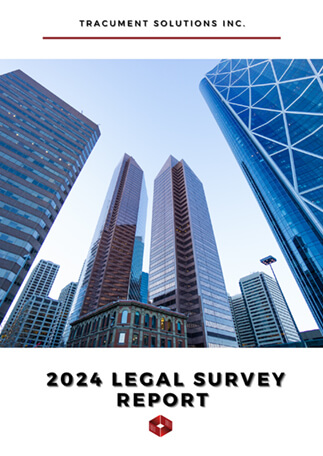
How to Retain Employees Past 3 Years
In our latest 2024 Legal Trends and Challenges Survey, we uncovered that the average employee tenure exceeds 5 years. Not the most thrilling discovery, but we did stumble upon something far more interesting: that firms are facing difficulty retaining employees beyond the 3 year mark (a three year itch, as it were).
Our data reveals a notable trend of employees leaving between 2–4 years of employment which poses an obstacle that affects team continuity and growth. Recognizing this trend, we've pinpointed three primary reasons as to why employees are leaving and outlined three strategies to assist in retaining valuable talent.
Why are Employees Leaving
-
Salary and Benefits
The first reason why employees are leaving firms around the three-year mark is also ranked number one in their considerations when evaluating job opportunities. Nearly 50% of respondents noted that salary and benefits were more important to them than mentoring and the complexity of the work. Respondents expressed dissatisfaction with their salaries, feeling they are not adequately compensated for their work. Competitive compensation and comprehensive benefits packages are crucial for retaining talent.
Another reason why employees may be focusing more on salary and benefits is inflation. Inflation has been a significant topic of discussion since the end of the pandemic in 2022. However, 64% of respondents stated that their salaries have not increased in the last 4 years to account for inflationary pressures. One respondent said, "The inflation raise was not even comparable to what we are living through. It was like giving me $5.00 when I really needed $30.00." The cost of living in Canada has skyrocketed, with essentials like groceries becoming increasingly expensive. According to Forbes, as of February 2023, grocery prices had risen to their highest levels in decades, increasing by 10.6% year-over-year, more than double the overall inflation rate of 5.2% at that time. Faced with these rising costs, employees are seeking better wages to support themselves and their families.
-
Work / Life Balance
One of the overall noted reasons as to why employees are leaving firms is the lack of work / life balance. This was also ranked second when participants were asked what they considered important when considering employment opportunities. One respondent stated, “Legal work is stressful and it is hard to maintain a family balance and keep sanity…” with others echoing the same sentiment saying,” No work-life balance. Constantly working and affecting my health”. Respondents are feeling constantly overworked, which has a negative impact on their health and well-being. With no balance in their life, employees are feeling burnt out and are looking to shift firms, jobs, or even careers.
-
Career Growth and Development
Employees feel stuck and unchallenged in their current roles and are opting to find better opportunities that align with their career goals. Our survey found that 50% of firms struggle to retain Legal Support positions more than any other position in a firm. A quote from our survey states, “I like to grow and improve as a person and changing a role that is a level higher makes me feel proud and good about myself and what I do”. This shows the need for firms to create paths for advancement and development for their employees to keep them motivated and committed.
3 Ways to Retain Employees
-
Enhancing Salary and Benefits
As inflation affects the cost of living, it is crucial to review and adjust salary and benefits to ensure they remain competitive and reflect the increased expenses employees may face. In addition to salary adjustments, offering a comprehensive benefits package can help alleviate the impact of inflation on employees' finances. Consider enhancing benefits with wellness programs, such as gym memberships, or mental health resources, to support employees' overall well-being without adding to their financial burden. Professional development opportunities such as workshops or courses, can also be offered as a valuable benefit to help employees stay competitive in their field.
-
Improving Work-Life Balance
A poor work-life balance can lead to employee burnout in any role. Spending excessive time at work can result in fatigue, poor mental health, and job dissatisfaction, ultimately leading to lower quality work or missed days. To address this, implement policies and initiatives that promote a healthy work-life balance both during and outside of work. These initiatives can address a variety of issues, including disconnecting from work, flexible working arrangements, parental / family leave, and employee assistance programs that support stress management, grief, anxiety, and child care.
Addressing these issues can improve work-life balance, leading to benefits such as better morale, higher staff retention, increased productivity, and reduced stress and burnout. This, in turn, will help employees enjoy their work and increase their likelihood of staying with your organization.
-
Fostering Career Growth and Development
To retain these legal professionals, it is important to provide them with opportunities for advancement and professional development. This can be achieved by creating clear pathways for career progression within the organization. This could include outlining specific criteria for promotion and providing regular feedback to employees on their progress towards these goals. Create a culture that values continuous learning and growth, and ensure that employees feel supported in their career aspirations within the organization. This might look like offering training programs and mentorship opportunities that can help employees develop new skills and expand their knowledge base. By investing in their professional development, firms can demonstrate commitment to their employees' growth and future success.
Conclusion
Retaining legal professionals past the 2–4 years mark requires a proactive approach that addresses their needs for growth, recognition and also career development. By investing in their development, offering competitive compensation, and nurturing a supportive culture, firms can create an environment where employees thrive and continue to contribute to long-term success.
You may also like
Happy Holidays Message from David Swadden, CEO
December 18, 2025
We would like to wish all our clients and readers a wonderful holiday season filled with joy and laughter.
Tracument Holiday Schedule
December 11, 2025
We would like to update all our clients of our Holiday Schedule this holiday season!
Tracument Wrapped!
December 4, 2025
What 2025 Looked like for Tracument and for you!




